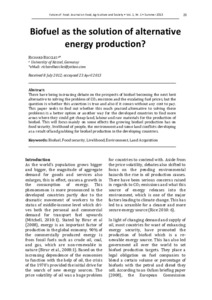Biofuel as the solution of alternative energy production?
| dc.date.accessioned | 2014-02-10T10:02:38Z | |
| dc.date.available | 2014-02-10T10:02:38Z | |
| dc.date.issued | 2013-04-23 | |
| dc.identifier.issn | 2197-411X | |
| dc.identifier.uri | urn:nbn:de:hebis:34-2014021044986 | |
| dc.identifier.uri | http://hdl.handle.net/123456789/2014021044986 | |
| dc.language.iso | eng | |
| dc.publisher | Department of Organic Food Quality and Food Culture at the University of Kassel, Germany and Federation of German Scientists (VDW) | eng |
| dc.rights | Urheberrechtlich geschützt | |
| dc.rights.uri | https://rightsstatements.org/page/InC/1.0/ | |
| dc.subject | Biofuel | eng |
| dc.subject | Food security | eng |
| dc.subject | Livelihood | eng |
| dc.subject | Environment | eng |
| dc.subject | Land Acquisition | eng |
| dc.subject.ddc | 630 | |
| dc.title | Biofuel as the solution of alternative energy production? | eng |
| dc.type | Aufsatz | |
| dcterms.abstract | There have being increasing debate on the prospects of biofuel becoming the next best alternative to solving the problem of CO2 emission and the escalating fuel prices, but the question is whether this assertion is true and also if it comes without any cost to pay. This paper seeks to find out whether this much praised alternative to solving these problems is a better option or another way for the developed countries to find more areas where they could get cheap land, labour and raw materials for the production of biofuel. This will focus mainly on some effects the growing biofuel production has on food security, livelihood of people, the environment and some land conflicts developing as a result of land grabbing for biofuel production in the developing countries. | eng |
| dcterms.accessRights | open access | |
| dcterms.bibliographicCitation | In: Future of Food: Journal on Food, Agriculture and Society. Witzenhausen : University of Kassel, Department of Organic Food Quality and Food Culture. - Vol. 1, No. 1 (2013), S. 23-29 | |
| dcterms.creator | Beccles, Richard |

